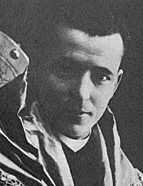

Manuel was the first-born of the eight children of Avelino Gonçalves Cerejeira and Joaquina do Sacramento de Jesus Rebelo. Usually described as a couple of farmers from Minho, Manuel’s baptism records his father as a “trader”, a reference to the production of clogs to which he was also dedicated. The income from these activities enabled them to provide their four sons with further education. The young Gonçalves Cerejeira continued his education after elementary school, with his preparatory studies at the Seminário-Liceu de Guimarães [High School Seminary in Guimarães] (1899-1904). The following year he completed a complementary course in literature at the Liceu Alexandre Herculano [Alexandre Herculano High School] in Porto from where he travelled to the Seminário Conciliar [Conciliar Seminary] in Braga to complete the Triennial Seminary Course (1906-1909), answering the call to ecclesiastical life that he said he had felt since he was a child. His alma mater in Coimbra provided him with a diverse higher education: he enrolled in Theology in 1909, completing his bachelor’s degree in the 1911-1912 academic year with a grade of 18 out of 20, just as the respective School was nearing its end. That same year he enrolled in the Law course, which he abandoned in order to enrol in the fourth section of the Faculdade de Letras, Ciências Históricas e Geográficas [School of Arts, Historical and Geographical Sciences] in 1912-1913, which he completed in 1916 with 19 points out of 20.
His theological studies gave him a good command of Latin and Greek, in addition to the basics of Hebrew, a subject in which he was the only ordinary student in 1910-1911. The literature degree gave him access to the German language, completing the two German language and literature courses (1913-1915) taught by Carolina Michaëlis Vasconcelos, whose knowledge he demonstrated in his historiographical work ( A Idade Média , p. 5; 17; 60). Above all, he revealed an affinity with and mastery of the French language, whose cultural universe was particularly dear to him and influenced him most profoundly.
This work is financed by national funds through FCT - Foundation for Science and Technology, I.P, in the scope of the projects UIDB/04311/2020 and UIDP/04311/2020.
